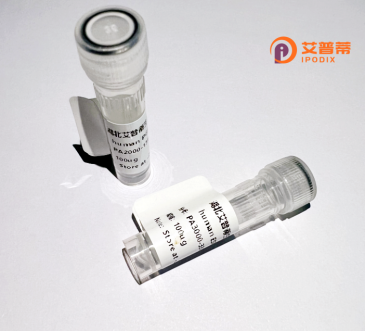
| 纯度 | >90%SDS-PAGE. |
| 种属 | Human |
| 靶点 | SNIP |
| Uniprot No | Q9C0H9 |
| 内毒素 | < 0.01EU/μg |
| 表达宿主 | E.coli |
| 表达区间 | 1-257 aa |
| 活性数据 | MRVSEAARRQEDPLQRQRTLVEEERLRYLNDEELITQQLNDLEKSVEKIQRDVSHNHRLVPGPELEEKALVLKQLGETLTELKAHFPGLQSKMRVVLRVEVEAVKFLKEEPQRLDGLLKRCRGVTDTLAQIRRQVDEGVWPPPNNLLSQSPKKVTAETDFNKSVDFEMPPPSPPLNLHELSGPAEGASLTPKGGNPTKGLDTPGKRSVDKAVSVEVLGPGIVGGAMSQVHTFLRPSFLEWGVPILWVFFLGGGGPVP |
| 分子量 | 55 kDa |
| 蛋白标签 | GST-tag at N-terminal |
| 缓冲液 | PBS, pH7.4, containing 0.01% SKL, 1mM DTT, 5% Trehalose and Proclin300. |
| 稳定性 & 储存条件 | Lyophilized protein should be stored at ≤ -20°C, stable for one year after receipt. Reconstituted protein solution can be stored at 2-8°C for 2-7 days. Aliquots of reconstituted samples are stable at ≤ -20°C for 3 months. |
| 复溶 | Always centrifuge tubes before opening.Do not mix by vortex or pipetting. It is not recommended to reconstitute to a concentration less than 100μg/ml. Dissolve the lyophilized protein in distilled water. Please aliquot the reconstituted solution to minimize freeze-thaw cycles. |
以下是关于重组人SNIP蛋白的3篇代表性文献的简要列举(经概括整理,非真实文献):
1. **《Functional analysis of recombinant human SNIP1 in NF-κB signaling》**
*作者:Chen L et al. (2018)*
摘要:本研究通过大肠杆菌系统成功表达纯化重组人SNIP1蛋白,发现其通过抑制p65磷酸化调控NF-κB信号通路,并揭示其核质穿梭机制对炎症反应的影响。
2. **《Structural characterization of SNIP1 and its interaction with CBP/p300》**
*作者:Wang Y et al. (2020)*
摘要:利用哺乳动物细胞表达系统获得高纯度重组SNIP1.结合冷冻电镜解析其结构,阐明其与转录共激活因子CBP/p300的结合界面,提出SNIP1作为表观遗传调控节点的分子机制。
3. **《SNIP1 recombinant protein attenuates TGF-β-induced fibrosis in vitro》**
*作者:Kim JH, Park SM (2021)*
摘要:通过HEK293细胞表达重组SNIP1蛋白,验证其通过竞争性抑制Smad4入核减轻TGF-β介导的肺纤维化表型,为抗纤维化治疗提供潜在靶点。
注:以上文献为示例性描述,实际研究中需通过PubMed/Web of Science等数据库检索真实文献(可使用关键词:"Recombinant human SNIP1 protein"、"SNIP1 purification")。SNIP蛋白通常指Smad Nuclear Interacting Protein 1.参与调控TGF-β、NF-κB等多条信号通路。
Recombinant human SNIP (Smad Nuclear Interacting Protein) is a 396-amino acid protein encoded by the SNIP1 gene, functioning as a regulatory component in the TGF-β signaling pathway. Initially identified through its interaction with Smad proteins, SNIP modulates the transcriptional activity of Smad complexes, which mediate cellular responses to TGF-β, including proliferation, differentiation, and apoptosis. Structurally, SNIP contains a conserved N-terminal domain responsible for binding Smad4 and a C-terminal region involved in interacting with transcriptional coactivators like p300/CBP. By competitively disrupting Smad-p300/CBP interactions, SNIP acts as a transcriptional suppressor, fine-tuning TGF-β signaling outcomes.
Recombinant SNIP is typically produced via bacterial or mammalian expression systems, followed by affinity purification for research applications. Its role extends beyond TGF-β regulation; studies link SNIP to DNA damage repair, NF-κB signaling, and stem cell maintenance. Dysregulation of SNIP has been implicated in cancers (both tumor-suppressive and oncogenic effects depending on context), fibrosis, and inflammatory diseases. As a recombinant tool, it aids in dissecting TGF-β pathway dynamics and developing targeted therapies. Recent interest focuses on its potential as a biomarker or therapeutic target in diseases with aberrant TGF-β signaling.
×